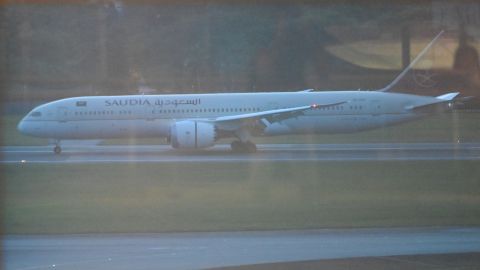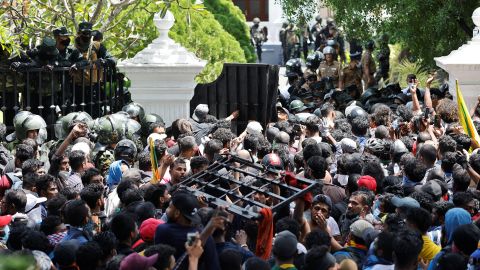CNN
—
Sri Lankan President Gotabaya Rajapaksa has landed in Singapore on a flight from Maldives after fleeing his country in the wake of anti-government protests.
Singapore said Rajapaska had been allowed to enter the country on a “private visit” but had not asked for or been granted asylum.
“It is confirmed that Mr. Rajapaksa has been allowed entry into Singapore on a private visit. He has not asked for asylum and neither has he been granted any asylum. Singapore generally does not grant requests for asylum,” the Singapore Foreign Ministry statement read.
Rajapaksa has yet to formally resign despite pledging to quit after angry demonstrators broke into his official residence, swam in his pool and demanded the end of his family’s ruling dynasty. He left the Maldivian capital Malé on board a “Saudi flight,” a high-ranking security source in Colombo told CNN.
CNN believes the source was referring to Saudia flight 788, which left Malé at 11:30 a.m. according to the source. The flight landed in Singapore at 7:17 p.m. local time Thursday, according to the Changi Airport website. Saudia is the flag carrier of Saudi Arabia. CNN has reached out to Saudia but has not heard back.

Rajapaksa had been in Maldives for one day after fleeing Sri Lanka in the early hours of Wednesday – the same day he had said he would resign.
But by Thursday, no formal resignation letter had been received by the Sri Lankan parliament’s speaker, raising questions about the intentions of an apparently self-exiled leader who appointed the prime minister as acting president during his absence from his island nation.
Shortly after Rajapaksa left the country, protesters stormed Acting President Ranil Wickremesinghe’s office to demand his removal. Wickremesinghe responded by calling a nationwide curfew overnight.
On Thursday, Wickremesinghe granted Sri Lanka’s armed forces special powers of arrest, and instructed them to “exercise force” if necessary to dispel protests across the nation, army spokesman Brigadier Nilantha Premaratne said in a televised address.
“In view of the escalation of violent acts, protesters intent on harming the armed forces or public property are earnestly urged to desist from all forms of violence immediately or be prepared to face consequences as members of the armed forces are legitimately empowered to exercise force,” Premaratne said.
Sri Lanka’s parliament will not reconvene until Rajapaksa formally submits his resignation letter, Speaker Mahinda Yapa Abeywardena said Thursday.
Previously, parliament had been expected to start the process of selecting a new president on Saturday, with the goal of voting in a new leader by July 20.
That timeline is now on hold until Rajapaksa officially leaves his post.

Many protesters have vowed to continue to demonstrate until both men step down.
By Thursday morning, as questions swirled over Sri Lanka’s future, a calm had descended on the streets of the commercial capital Colombo.
A lawyer representing the People’s Protest Movement said Thursday all occupied buildings, except the Presidential Secretariat, will be handed back to authorities.
“We want to affirm that this is a peaceful protest and have no intention to resort to any form of violence,” Swasthika Arulingam told reporters.
“This has always been and will continue to be a peaceful movement.”
But everywhere there are signs that the country remains on a knife edge.
Amid crippling shortages of fuel, abandoned vehicles line the streets near gas stations. People are no longer able to drive to work, so they cycle instead. Some have taken to sleeping in their cars.
The Sri Lankan police force said one police officer had been seriously injured during the protests and was receiving treatment in hospital. An army sergeant had also been injured, it added.
United Nations Secretary General António Guterres on Thursday said he was following the events in Sri Lanka “very closely” and called for a “peaceful and democratic transition.”
“It is important that the root causes of the conflict and protesters’ grievances are addressed,” he wrote on Twitter. “I urge all party leaders to embrace the spirit of compromise for a peaceful and democratic transition.”

